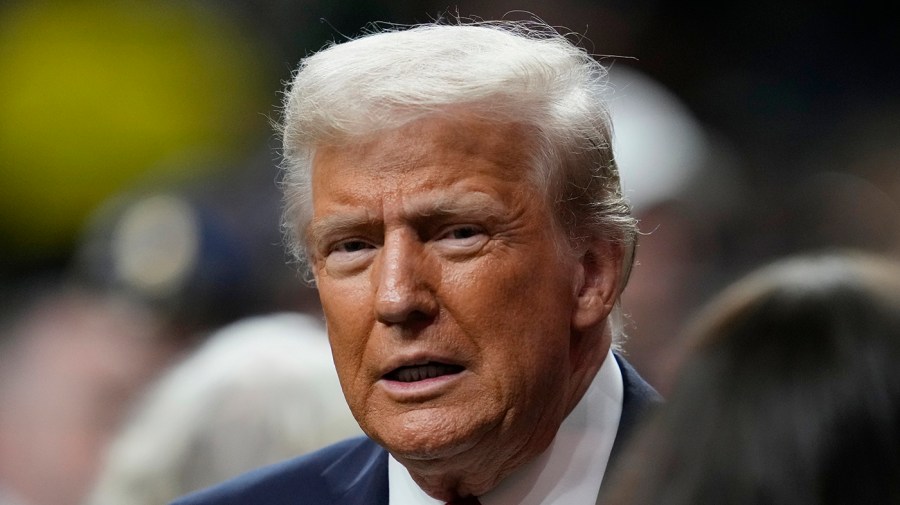President Trump’s proposal to permanently resettle Palestinians from the Gaza Strip is complicating relationships with allies in the Arab world.
His meeting Tuesday with Jordan’s King Abdullah II stands to be an awkward moment as Trump continues to suggest Abdullah’s country take in more Palestinians, who by some estimates already take up about half the population.
But Trump’s proposal has been met with steep opposition from the greater Arab world, who see Palestinian resettlement as a nonstarter, in addition to going against decades of U.S. foreign policy on the Israeli-Palestinian conflict.
“Arab nations and global leaders have been clear in their opposition to the ethnic cleansing of Palestinians and the urgent need to rebuild Gaza so its people can live with dignity and security,” said Iman Awad, national director of policy and advocacy at Emgage Action, a Muslim American advocacy group, in a statement.
“In particular, we expect that the upcoming meeting with the Jordanian King will reinforce these concerns, underscoring the necessity of upholding international law and preventing the displacement of millions of Palestinians,” Awad added.
Trump sent shockwaves through the Middle East last week when he proposed the United States would take control of the Gaza Strip and rebuild it. He since has offered some new details of his vision, including that U.S. troops would not get involved, while sending mixed messages about the fate of Palestinians.
The president for weeks has said he would like to see Jordan, Egypt and other nations in the region take in Palestinians who would be relocated out of Gaza.
While the White House has suggested the relocation would only be temporary while Gaza is rebuilt — something officials have said could take 10 years to 15 years — Trump has been less clear about the long-term plan for displaced Palestinians.
“It would be my hope that we could do something really nice, really good, where they wouldn’t want to return. Why would they want to return? The place has been hell,” Trump told reporters last week alongside Israeli Prime Minister Benjamin Netanyahu.
But Trump then told Fox News’s Bret Baier during a pre-Super Bowl interview that Palestinians would not have the right to return to Gaza after it is rebuilt “because they’re going to have much better housing.”
“In other words, I’m talking about building a permanent place for them because if they have to return now, it’ll be years before you could ever — it’s not habitable. It would be years before it could happen,” Trump said.
But Trump’s proposal has fallen flat with the Arab nations that would be key to making it happen.
Leaders in the region have said efforts to displace Palestinians or move them into neighboring countries are a nonstarter. Egypt and Jordan — countries with peace treaties with Israel — oppose absorbing more Palestinians, claiming it poses a security risk, is destabilizing and threatens to provoke mass opposition.
Jordan already houses about 3 million Palestinians, many of whom have been displaced by prior wars.
Egypt announced Sunday it would host a summit of Arab nations on Feb. 27 to discuss the latest developments around the future of Palestinians, according to The Associated Press.
Some experts have suggested Trump’s proposal may be a negotiating tactic, just as he used the threat of tariffs against Mexico and Canada to secure commitments to protecting the border.
But Trump administration officials have touted the president’s proposal as an out-of-the-box suggestion to address a decades-long quagmire.
“Now is the time for the other governments and other powers in the region, some of these very rich countries, to basically say, OK, we’ll do it. We’re going to pay for this; we’re going to step forward; we’re going to be the ones that take charge,” Secretary of State Marco Rubio said Monday on SiriusXM.
“None of them is offering to do it,” he added. “And I think that you can’t go around claiming that you’re a fighter for, an advocate for the Palestinian people, but you’re not willing to do anything to help rebuild Gaza.”
Rubio is set to travel to the Middle East later this week, with stops planned in Israel, Qatar and Saudi Arabia.
Trump’s controversial proposal will serve as the backdrop for a key meeting Tuesday, when the president hosts Jordan’s king at the White House.
While in Washington, Abdullah is set to meet with Trump, Rubio, White House national security adviser Mike Waltz, special envoy to the Middle East Steve Witkoff and members of Congress. Abdullah met Sunday with Defense Secretary Pete Hegseth.
White House officials did not respond to requests for comment about what would be on the agenda for Tuesday’s meeting, but the Gaza proposal is expected to be central to the visit.
Abdullah met Wednesday with Palestinian President Mahmoud Abbas, the day after Trump first floated the idea of the U.S. taking over Gaza. The Jordanian royal court posted on social media following that meeting that Abdullah “stresses the need to put a stop to settlement expansion, expressing rejection of any attempts to annex land and displace the Palestinians.”
A former National Security Council aide in the Biden White House argued Trump’s comments about Gaza “overshadow the meeting and start it out on a pretty rough note.”
“Driving a wedge with our allies especially in pursuit of goals that are unrealistic … and cause significant heartburn in the region for our allies, it just makes no sense,” the aide said.
Alex Gangitano contributed.
